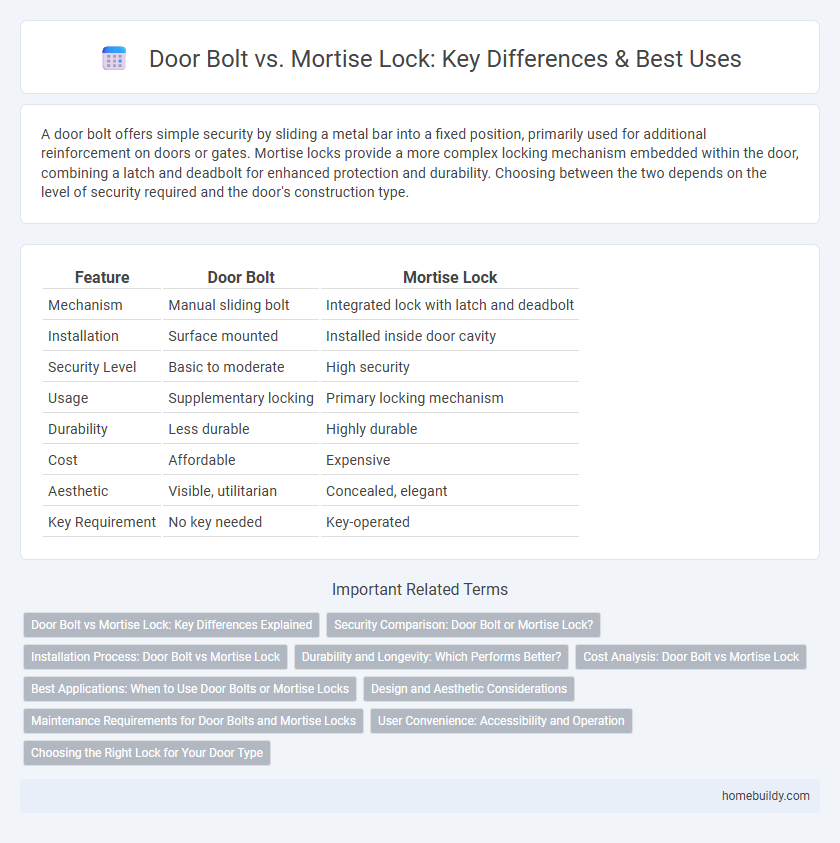A door bolt offers simple security by sliding a metal bar into a fixed position, primarily used for additional reinforcement on doors or gates. Mortise locks provide a more complex locking mechanism embedded within the door, combining a latch and deadbolt for enhanced protection and durability. Choosing between the two depends on the level of security required and the door's construction type.
Table of Comparison
| Feature | Door Bolt | Mortise Lock |
|---|---|---|
| Mechanism | Manual sliding bolt | Integrated lock with latch and deadbolt |
| Installation | Surface mounted | Installed inside door cavity |
| Security Level | Basic to moderate | High security |
| Usage | Supplementary locking | Primary locking mechanism |
| Durability | Less durable | Highly durable |
| Cost | Affordable | Expensive |
| Aesthetic | Visible, utilitarian | Concealed, elegant |
| Key Requirement | No key needed | Key-operated |
Door Bolt vs Mortise Lock: Key Differences Explained
Door bolts provide a simple and cost-effective security solution by sliding a metal bar into a fixed slot, offering easy installation and visible reinforcement on doors. Mortise locks, embedded within the door itself, combine a latch and deadbolt mechanism for enhanced security, durability, and smoother operation, often preferred in commercial or high-security settings. Choosing between a door bolt and a mortise lock depends on the required security level, aesthetic preference, and door type compatibility.
Security Comparison: Door Bolt or Mortise Lock?
A door bolt offers straightforward security through a solid metal bar sliding into a brace, providing strong resistance against forced entry, ideal for simple applications like gates or interior doors. Mortise locks integrate a deadbolt and latch mechanism within the door, delivering enhanced security with complex keyways and hardened steel components that resist picking and drilling. For high-security needs, mortise locks outperform door bolts by combining mechanical strength and advanced locking features, though door bolts remain effective for secondary reinforcement.
Installation Process: Door Bolt vs Mortise Lock
The installation process of a door bolt is generally simpler and quicker, requiring only surface mounting on the door and frame without extensive modifications. In contrast, mortise locks demand precise cutting of a pocket within the door edge to fit the lock body, making the installation more complex and time-consuming. Choosing between the two depends on the desired security level and the user's willingness to handle or hire professional installation.
Durability and Longevity: Which Performs Better?
Door bolts typically offer higher durability due to their simple, robust design with fewer moving parts prone to wear, making them ideal for long-term use in high-traffic or exterior settings. Mortise locks, while providing advanced security features and aesthetic appeal, have more intricate components that may require regular maintenance and can experience faster wear over time. For longevity in harsh environments, door bolts generally outperform mortise locks, ensuring sustained functionality with minimal upkeep.
Cost Analysis: Door Bolt vs Mortise Lock
Door bolts generally offer a lower upfront cost compared to mortise locks, making them a budget-friendly choice for basic security needs. Mortise locks, with their integrated locking mechanism and enhanced durability, tend to require higher installation and maintenance expenses. When evaluating long-term value, mortise locks provide superior security and longevity, potentially reducing replacement frequency and associated costs over time.
Best Applications: When to Use Door Bolts or Mortise Locks
Door bolts provide straightforward, surface-mounted security ideal for internal doors, gates, or sliding doors where quick locking is needed. Mortise locks offer integrated, high-security solutions suited for main entrances or commercial buildings requiring durable, tamper-resistant locking mechanisms. Choose door bolts for simplicity and easy installation, while mortise locks are best for robust security applications demanding enhanced strength and functionality.
Design and Aesthetic Considerations
Door bolts offer a minimalist design with exposed mechanisms that emphasize simplicity and functionality, often complementing rustic or industrial interior styles. Mortise locks feature a more refined and integrated aesthetic, as their locking mechanism is embedded within the door, providing a sleeker appearance suited for modern or traditional decor. The choice between door bolt and mortise lock depends on the desired blend of visible hardware and overall door design harmony.
Maintenance Requirements for Door Bolts and Mortise Locks
Door bolts require minimal maintenance, typically needing occasional lubrication and tightening to ensure smooth operation and prevent rust. Mortise locks demand more frequent maintenance due to their complex internal mechanisms, including regular cleaning, lubrication, and adjustment to maintain security and functionality. Proper upkeep of both locking systems prolongs their lifespan and ensures reliable performance.
User Convenience: Accessibility and Operation
Door bolts offer straightforward accessibility and simple operation, making them ideal for quick locking and unlocking without complex mechanisms. Mortise locks require precise alignment and key use, which can be less convenient for frequent or rapid access. Users prioritizing ease of use often prefer door bolts for their direct manual control and minimal effort.
Choosing the Right Lock for Your Door Type
A door bolt offers simple surface-mounted security ideal for wooden doors, while a mortise lock provides enhanced strength with an embedded mechanism suitable for heavier or metal doors. Selecting the right lock depends on door material, security needs, and installation complexity, with mortise locks delivering superior durability and door bolt locks facilitating easy retrofitting. For optimal protection and functionality, assess the door's design and usage frequency before deciding between a door bolt or mortise lock.
Door bolt vs mortise lock Infographic

 homebuildy.com
homebuildy.com